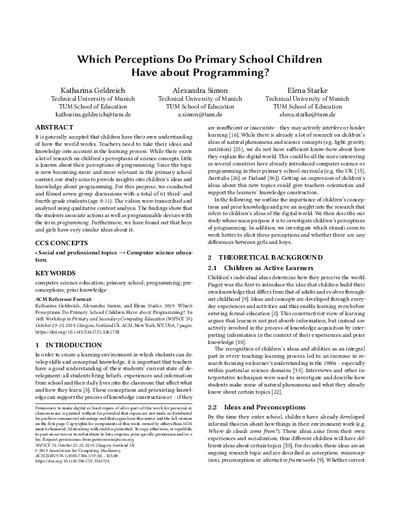Which Perceptions Do Primary School Children Have about Programming? Publikationsdatum:
|
 |
 Diese Seite wurde seit 1 Jahr inhaltlich nicht mehr aktualisiert.
Unter Umständen ist sie nicht mehr aktuell.
Diese Seite wurde seit 1 Jahr inhaltlich nicht mehr aktualisiert.
Unter Umständen ist sie nicht mehr aktuell.
 Zusammenfassungen
Zusammenfassungen

It is generally accepted that children have their own understanding of how the world works. Teachers need to take their ideas and knowledge into account in the learning process. While there exists a lot of research on children's perceptions of science concepts, little is known about their perceptions of programming. Since the topic is now becoming more and more relevant in the primary school context, our study aims to provide insights into children's ideas and knowledge about programming. For this purpose, we conducted and filmed seven group discussions with a total of 61 third- and fourth-grade students (age 8-11). The videos were transcribed and analyzed using qualitative content analysis. The findings show that the students associate actions as well as programmable devices with the term programming. Furthermore, we have found out that boys and girls have very similar ideas about it.
 Dieses Konferenz-Paper erwähnt ...
Dieses Konferenz-Paper erwähnt ...
 Dieses Konferenz-Paper erwähnt vermutlich nicht ...
Dieses Konferenz-Paper erwähnt vermutlich nicht ... 
 Nicht erwähnte Begriffe | Bildung, Digitalisierung, Fehlvorstellungen beim Programmieren, Kinder, Lernen, Schweiz, Unterricht |
 Tagcloud
Tagcloud
 Zitationsgraph
Zitationsgraph
 Zitationsgraph (Beta-Test mit vis.js)
Zitationsgraph (Beta-Test mit vis.js)
 Zeitleiste
Zeitleiste
 2 Erwähnungen
2 Erwähnungen 
- WiPSCE '21 - The 16th Workshop in Primary and Secondary Computing Education, Virtual Event / Erlangen, Germany, October 18-20, 2021 (Marc Berges, Andraes Mühling, Michal Armoni) (2021)
- An Experience of Introducing Primary School Children to Programming using Ozobots - (Practical Report) (Nina Körber, Lisa Bailey, Luisa Greifenstein, Gordon Fraser, Barbara Sabitzer, Marina Rottenhofer) (2021)


- An Experience of Introducing Primary School Children to Programming using Ozobots - (Practical Report) (Nina Körber, Lisa Bailey, Luisa Greifenstein, Gordon Fraser, Barbara Sabitzer, Marina Rottenhofer) (2021)
- Programmieren in der Grundschule - Eine Design-Based-Research-Studie (Katharina Geldreich) (2023)


 Anderswo finden
Anderswo finden
 Volltext dieses Dokuments
Volltext dieses Dokuments
 |  Which Perceptions Do Primary School Children Have about Programming?: Artikel als Volltext ( Which Perceptions Do Primary School Children Have about Programming?: Artikel als Volltext ( : :  , 988 kByte; , 988 kByte;  : :  ) ) |
 Anderswo suchen
Anderswo suchen 
 Beat und dieses Konferenz-Paper
Beat und dieses Konferenz-Paper
Beat hat Dieses Konferenz-Paper während seiner Zeit am Institut für Medien und Schule (IMS) ins Biblionetz aufgenommen. Beat besitzt kein physisches, aber ein digitales Exemplar. Eine digitale Version ist auf dem Internet verfügbar (s.o.). Es gibt bisher nur wenige Objekte im Biblionetz, die dieses Werk zitieren.









 LehrerIn
LehrerIn Primarschule (1-6) / Grundschule (1-4)
Primarschule (1-6) / Grundschule (1-4) Programmieren
Programmieren Schule
Schule







 Biblionetz-History
Biblionetz-History